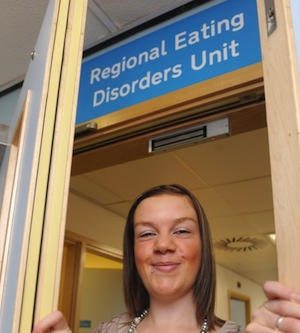When Should I Seek Inpatient Treatment For My Eating Disorder?

Even considering to seek inpatient treatment for your eating disorder is a big step. On the whole, we don't like to admit how bad things have gotten. Considering inpatient or residential treatment means that you have to recognize that your behaviors, your thoughts, your eating disorder is out of control. It's nearly inconceivable at some points to think this - after all, isn't your eating disorder what gives you control? Why would we seek inpatient treatment for the eating disorder?
My Friend Is Seeking Inpatient Treatment for Her Eating Disorder
A friend of mine (who also has an eating disorder) called me a couple of days ago and said, "I just did something kind of crazy and I need to tell someone." And while I run through all the worst case scenarios simultaneously in my brain she says, "I called [our old treatment center] and scheduled an assessment."
We were roommates in treatment last summer and since we discharged, we call each other every week or so to check in. I knew she wasn't doing well and was really struggling, even in her day program. "That's not crazy," I told her. "That's amazing. I am so proud of you."
Is It Time for Me to Seek Inpatient Treatment Again?
I've been trying to avoid the inpatient conversation with my dietitian for weeks, and finally got cornered by my therapist on Monday.

Knowing that my team (and my family) think that it would be appropriate for me to go back into treatment made me think stop and think seriously about what whether or not another [hopefully short] stay in treatment would be beneficial.
So I had to run my current experience of my eating disorder against my ideas of when to seek treatment.
When Should I Seek Inpatient Treatment?
First of all, let me begin by saying that I'm not a professional. (I know, I know. You're shocked by this.) This advice should never supersede your treatment team's suggestions as to what would be best for you. However, this can be a great place to start a conversation with your team.
Also, a disclaimer. I use "inpatient" and "residential" fairly synonymously in this article. Inpatient usually refers to a hospital setting, while residential is slightly less structured and less medically-based. Some insurances will cover inpatient but not residential and vice versa. Use these guidelines to consider inpatient and/or residential - don't let the word "inpatient" trick you into thinking that these guidelines aren't for you, too.
- Other levels of care have been ineffective: Perhaps you've been doing outpatient for long time. Maybe you've tried partial hospitalization programs. If your eating disorder symptoms are continuing to worsen despite this type of care, you may want to consider inpatient treatment.
- There are secondary behaviors to consider: Self harm is common among patients with eating disorders. If you have a history of self harm or are concerned that you might begin to self harm as you get treatment, inpatient or residential treatment is a great way to keep yourself safe. This also goes for alcohol abuse or overexercise or any other behavior that might interfere with your healing.
- You need psychiatric stabilization: If you are extremely depressed or suicidal or have other comorbid psychiatric illnesses, it might be best for you to begin treatment for your eating disorder somewhere that can also monitor your mood and make adjustments to your medications as necessary.
- You are medically compromised or could become so during refeeding: A friend once put it beautifully: "Eating disorders are a mental illness with very serious physical side effects." If you are currently experiencing physical symptoms due to your eating disorder, you may want to consider getting treatment in an environment that can keep close tabs on your physical well-being and act immediately should you experience worsening conditions. (This is particularly a concern for anorexics during the refeeding process - prolonged starvation followed by "sudden" eating can cause extreme electrolyte imbalances, among other things, that need to be closely watched by a doctor.)
- You are not able to gain weight/stop bingeing/stop purging at home: Sure, this probably falls under all the above categories already, but I need to make it very clear - not just for you, but for me. The first step to a full recovery from an eating disorder is nutritional restoration - this means no starving, no bingeing, no purging. If you're unable to do this in your current situation, inpatient treatment could give you the head start you need to continue on your own at home.
Do I think this is an extensive list? Certainly not. I would love to hear any other thoughts or suggestions that you might have. These are simply guidelines that I've used in the past to help determine if I need to step up the level of care.
Oh, and guidelines that I'm using in the present. I've got an assessment with an inpatient facility next week.
APA Reference
Hudgens, J.
(2013, March 7). When Should I Seek Inpatient Treatment For My Eating Disorder?, HealthyPlace. Retrieved
on 2026, January 1 from https://www.healthyplace.com/blogs/survivinged/2013/03/when-should-i-seek-inpatient-treatment-for-my-eating-disorder
Author: Jessica Hudgens
I am glad you mentioned that refeeding anorexics can be very dangerous and should be conducted in an inpatient center. I am in the process of healing from my own eating disorder. Thanks for the information on why inpatient treatment centers are right for you.
Want to start out by saying that I have Medicaid. My psychologist says he's not concerned unless weight goes below xxx pounds, and even told me I would be fine at xx pounds. I'm 5 ft. 4. None of my team is concerned at all. I also have DID which complicates things. My psychologist tells me to just forget all the beliefs I've had about food for the last 17 years. He wants me to email hem my trauma in detail what i can remember of it. I've only been seeing him for a month. I dont live in an area where ED treatment is available. The closest IOP program is 2 and a half hours away from me. Behaviors are happening every day and BMI is 18.4. Hope that was ok to post. I dont know what to do. My primary doctor said i wasnt sick enough for ED treatment.
Hi, Rayette
Thank you for reaching out. My name is Mary-Elizabeth, and I am the author of this "Surviving ED" blog. First, it's important to keep in mind the severity of an eating disorder cannot be measured in pounds. Just because your psychologist thinks you don't meet an arbitrary weight threshold doesn't mean there's no cause for concern. If you are engaging in ED behaviors on a daily basis, I would highly recommend looking into treatment options. Or at least, seek out a counselor/therapist who specializes in eating disorders. If you're not sure where to begin your search, the HealthyPlace Eating Disorder Community is a beneficial resource (https://www.healthyplace.com/eating-disorders/). But please don't count yourself out for getting help just because certain people think your weight isn't "low enough." If the behavioral patterns are consistent, you don't have to keep living in that destructive cycle. You deserve to explore your treatment options.
I want to start by saying that I hope you are doing well, as I can see this was written over 3 years ago. I guess I'm leaving my comments just bc I need to say something. I literally just got home from taking my 22 year old daughter to a residential treatment center here in our state. I've been bawling my eyes out the entire drive home as well as in this very moment. I'm a single parent of two and she is my oldest. We are all very close and I can say this is most definitely the hardest thing I have ever done which in all honesty says a lot. My daughter I can say is a little naive and isn't one to research things. I wasn't sure and am still not sure if this was the best thing for her. On one hand she absolutely needs help and the dr's here are no good at working on her entire core, finding the root of the problem and then teaching how to cope and then manage. They are more into treating the symptoms once every month a lot of come back and we will see if anything has changed sort of thing. Anyway, I knew what she would be facing. She binges so seeing the girls with tubes in their nose and people in wheelchairs too weak to walk on their own frightened her ever being. So much anxiety and the overwhelming effects it can do to a person. They rushing her away bc of the tight schedule to see dr's and blood work all she had a chance to say to me was "Mom, now I'm not so sure I belong here I'm not that bad as the others." Now I can't stop thinking....is she? She doesn't do things even remotely like this without me by her side. I just want to hold her hand and hold her tight! But she is strong and I have to believe God wouldn't have put her in that facility unless he deemed it safe, helpful and knowledgable.
Hi, for starters, I hope your daughter is in a better place now than she was back in 2016. I'm 21, wondering if I might end up in hospital with my eating disorder, and worrying terribly over it. Your comment is wonderful comfort to me. God does all things well. We have nothing if not belief. God be with you and your daughter. - Hannah
Great post! I think the back and forth about "should I go? should I not go?" is so difficult, and I think you've highlighted some really important points to consider when trying to make that decision. Thanks for sharing this! Good luck with the assessment, I'm so glad you're taking this positive step for yourself!
Thanks, Alie! I'm sure there are other things to consider when going into inpatient/residential treatment (i.e., finances - but that's another post for another day!), but I think these are the tops in terms of what I use to decide if I should seek a higher level of care, and also what I ask friends when they are considering higher levels of care.
I am so proud of you, Jess! I second, Nikki. Keep fighting the good fight. God wants to use that wonderful temple of yours. ;)
Thanks, Jade. You have no idea how nerve-wracking it was to insert my own personal addendum to this article!
Jess, I will throw my experience out here. After battling my eating disorder for many years, including trying numerous recovery options, I finally made the decision to be admitted to a treatment center. After working through the painful issues that were at the root of my eating disorder, I am absolutely positive I could never have done it if I hadn't been in the safety of a treatment center and removed from the stresses of daily life. Now I have fourteen months of recovery behind me and am continuing to move forward. It has been a very difficult journey but I would not be where I am today if I hadn't chosen to go into treatment. ... Great article. :-)
Thanks, Linda! I certainly think there is a point where residential/inpatient is necessary and another where it's not [medically] necessary, but very beneficial. Congrats on your 14 months of recovery -- that's awesome!
Jess---
you are amazing. Keep fighting. Keep talking. Keep sharing your beautiful life with the world. I love you!